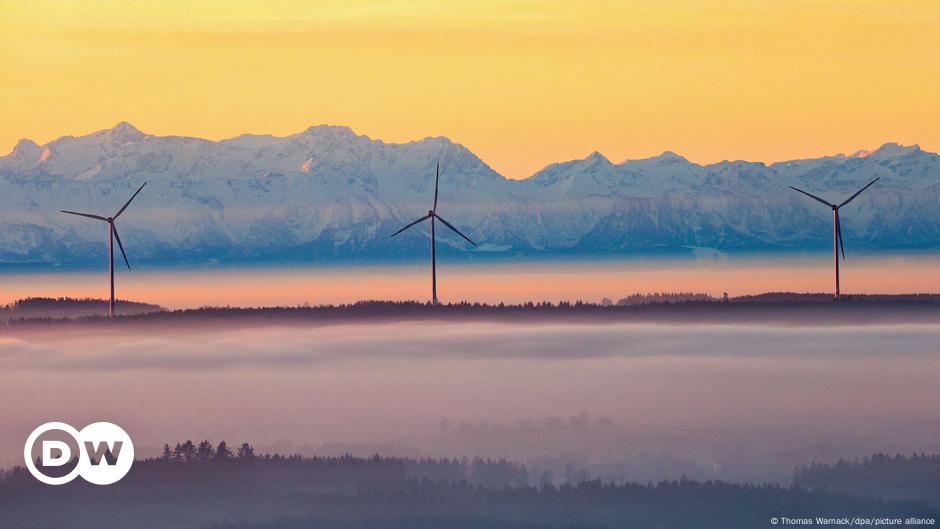Germany’s leading source of electricity generation gets a big boost in 2024, according to the latest industry data.
A new report from the German Wind Energy Association and VDMA Power Systems, the power plant engineering association, says regulators have approved more than 2,400 new onshore wind turbines with a total output of almost 14 gigawatts, a record high.
“This is an important step in the right direction,” said Dennis Rendschmidt, managing director of VDMA. He said the government “must maintain this momentum” regardless of the outcome of the February 23 federal election.
But despite the positive data, the far-right Alternative for Germany (AfD) has made strongly opposing Germany’s energy policies – and wind in particular – a key part of its election campaign. At the AfD’s recent party congress, chancellor candidate Alice Weidel railed against “unreliable” renewable energy, which she said doesn’t work “when the wind doesn’t blow and the sun doesn’t shine,” German broadcaster ZDF said.
Speaking at the Congress, Weidel vowed to destroy all of Germany’s “windmills of shame”. He called on Germany to phase out the use of planet-warming fossil fuels, including Russian gas, and to bring back nuclear power as part of a “sustainable, serious energy mix” – a plan that most experts have called unrealistic.
Return to nuclear energy ‘not plausible’
“A return to nuclear power in Germany is not plausible or helpful in the context of climate protection – nor would it be economical,” said Wolf-Peter Schill, an energy expert at the German Institute for Economic Research in Berlin. Shut down its last three reactors about two years ago.
,[The reactors] have already been destroyed to such an extent that they cannot be easily brought back into operation.” He said building new nuclear plants would take too long to be of any help in achieving climate goals.
Virtually dismantling all of Germany’s wind turbines, which today number more than 30,000, according to experts, would cost the country dearly in the form of decommissioning fees, confiscation and compensation. And this is without taking into account the costs associated with meeting the energy deficit, as Germany would be forced to increase its electricity imports, thereby increasing the price of electricity for consumers and businesses.
While Schill said a huge increase in solar power could help replace wind to some extent, he stressed that photovoltaic panels were not always the best option for replacing wind turbines in Germany, especially in the dark winter months. .
“If you don’t want wind power or solar power, the only alternative is fossil fuels,” he told DW. “I don’t see any other realistic option for power generation in Germany.” Human burning of fossil fuels for things like heating and industry is the main driver of rising global temperatures associated with extreme weather events around the world.
Renewable energy supplies about two-thirds of Germany’s electricity
Despite Weidel’s claims that renewable energy is holding Germany back, the latest government figures seem to prove otherwise. Data released by the federal energy regulator, the Bundesnetzagentur, in early January showed that 59% of Germany’s electricity in 2024 came from renewable sources, up from 56% in 2023. A little more than half of this came from the air.
Robert Habeck, Germany’s head of climate and economic affairs, attributed the increase to steps taken by the centre-left SPD/Greens/FDP coalition government over the past two years to “simplify and speed up” the permitting process for wind and solar installations .
Schill said decisions taken by the outgoing government have set the stage for “very strong growth” for wind energy, which will likely allow Germany to achieve its target of 115 gigawatts of installed capacity for onshore wind energy by 2030. Bringing you on the path. Larger, more advanced wind turbines are now being built to replace aging power stations, and these could help bring renewable energy up to about 80% of the country’s total energy supply.
Schill said it would be “ludicrous” for the next government not to take advantage of the incentives given to the renewables sector. “This AfD move to not only put the brakes on wind energy but to destroy it goes completely in the wrong direction.”
Wind energy has an edge in Germany
Increasing the share of renewable energy in electricity generation could help reduce energy prices in Germany, which are among the highest in the world. Schill explained that wind power plays such an important role in climate neutrality plans, “precisely because it is cheap.”
A study conducted in July 2024 by the Fraunhofer Institute, which calculated the average cost of electricity production over the lifetime of a power plant, showed a large gap between renewable energy and conventional power plants in Germany. Different types of solar and wind power cost from €0.41 to €0.225 per kWh, while gas, coal and nuclear power cost from €0.109 to €0.49 per kWh – with nuclear being the most expensive.
Energy costs were also a major point in Weidel’s opposition to renewable energy. In his interview with ZDF, he emphasized the burden that wind causes on the German economy, saying, “Our companies are no longer competitive because of high energy prices.”
“There is no relevant future energy scenario that I know of that would not depend on a mix [solar] And wind power,” Schill said. And the renewables sector is boosting the economy in its own right, as Kerstin Andreae, a former Greens lawmaker and president of the German Association of Energy and Water Industries, said earlier this week.
“Wind energy is not only a means of climate protection, but also contributes to economic stability by creating jobs and promoting investment,” he said in a statement on January 13. He said wind energy has also helped in ensuring supply in times of energy shortage. Caused by Russia’s invasion of Ukraine in 2022.
According to Schill, the fact that many wind turbine manufacturers are based in Germany and Europe has also given the industry an edge. “Unlike other energy technologies, for example photovoltaics where we are highly dependent on imports from China, this is not the case with wind energy,” he said. “From a flexibility perspective, wind power has many advantages.”
Edited by: Tamsin Walker






Leave a Reply